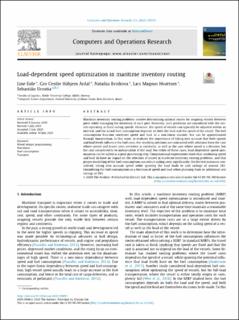| dc.contributor.author | Eide, Line | |
| dc.contributor.author | Årdal, Gro Cesilie Håhjem | |
| dc.contributor.author | Evsikova, Nataliia | |
| dc.contributor.author | Hvattum, Lars Magnus | |
| dc.contributor.author | Urrutia, Sebastián | |
| dc.date.accessioned | 2022-11-15T09:09:38Z | |
| dc.date.available | 2022-11-15T09:09:38Z | |
| dc.date.created | 2020-07-16T10:24:42Z | |
| dc.date.issued | 2020 | |
| dc.identifier.citation | Computers & Operations Research, 2020, 123 (November), 105051 | en_US |
| dc.identifier.issn | 0305-0548 | |
| dc.identifier.uri | https://hdl.handle.net/11250/3031823 | |
| dc.description.abstract | Maritime inventory routing problems involve determining optimal routes for seagoing vessels between ports while managing the inventory of each port. Normally, such problems are considered with the vessels operating at fixed sailing speeds. However, the speed of vessels can typically be adjusted within an interval, and the actual fuel consumption depends on both the load and the speed of the vessel. The fuel consumption function combines speed and load in a non-linear manner, but can be approximated through linearization. In this work, to evaluate the importance of taking into account that both speeds and load levels influence the fuel costs, the resulting solutions are contrasted with solutions from the case where speeds and travel costs are taken as constants, as well as the case where speed is a decision, but the cost considered to be independent of the load. For either of these cases, load-dependent speed optimization can be added as a post-processing step. Computational experiments show that combining speed and load do have an impact on the selection of routes in maritime inventory routing problems, and that proper modelling of the fuel consumption can reduce sailing costs significantly. On the test instances considered, taking into account speed while ignoring the load leads to cost savings of around 38%. Considering the fuel consumption as a function of speed and load when planning leads to additional cost savings of 28%.
Keywords: mixed integer programming, non-linear, fuel consumption, transport | en_US |
| dc.language.iso | eng | en_US |
| dc.rights | Attribution-NonCommercial-NoDerivatives 4.0 Internasjonal | * |
| dc.rights.uri | http://creativecommons.org/licenses/by-nc-nd/4.0/deed.no | * |
| dc.title | Load-dependent speed optimization in maritime inventory routing | en_US |
| dc.type | Peer reviewed | en_US |
| dc.type | Journal article | en_US |
| dc.description.version | publishedVersion | en_US |
| dc.source.pagenumber | 1-12 | en_US |
| dc.source.volume | 123 | en_US |
| dc.source.journal | Computers & Operations Research | en_US |
| dc.source.issue | November | en_US |
| dc.identifier.doi | https://doi.org/10.1016/j.cor.2020.105051 | |
| dc.identifier.cristin | 1819559 | |
| dc.source.articlenumber | 105051 | en_US |
| cristin.ispublished | true | |
| cristin.fulltext | original | |
| cristin.qualitycode | 2 | |

